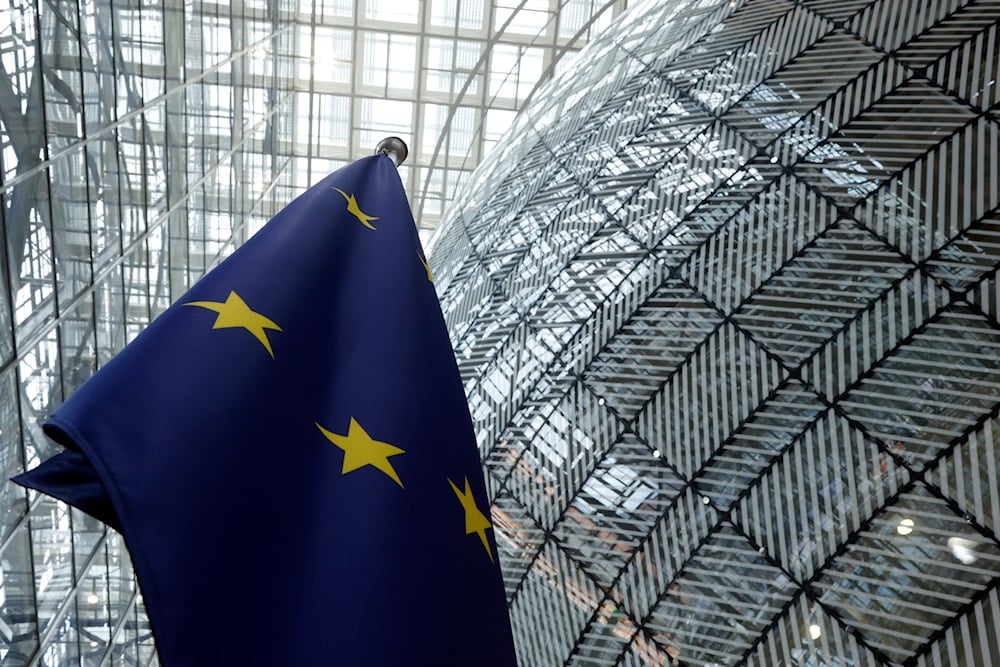France rallies EU support to deploy trade weapon against Trump tariffs
As Trump threatens new tariffs on EU exports, France pushes the bloc to consider activating its toughest trade defense tool amid growing calls for unity and retaliation.
-

The European Union flag stands inside the atrium at the European Council building in Brussels, June 17, 2024 (AP)
France is leading a push within the European Union to activate the bloc’s most powerful trade defense mechanism in response to escalating threats from US President Donald Trump, who has warned of sweeping new tariffs on European goods, Bloomberg reported.
According to sources familiar with the matter, more than six EU member states now back France’s call to trigger the anti-coercion instrument (ACI), a legal tool created to respond to economic intimidation from foreign powers. While some countries remain hesitant or have yet to take a formal position, support for the move has grown significantly following Trump’s latest ultimatum, the sources told Bloomberg on condition of anonymity due to the sensitivity of the talks.
EU trade ministers recently met to discuss the issue, with France positioning itself at the forefront of efforts to mount a firm collective response.
France: EU must show strength, unity
Benjamin Haddad, France’s Minister for European Affairs, emphasized the need for a resolute stance in the face of US pressure. “In this negotiation, you need to show strength, you need to show force, unity, and resolve,” he told Bloomberg Television this week. He added that the EU could go “further” than the European Commission’s current proposed countermeasures, which already target nearly €100 billion ($116 billion) worth of US exports.
While the European Commission, which manages trade policy for the bloc, has so far refrained from invoking the ACI, Commission President Ursula von der Leyen acknowledged on Sunday that the tool was created for “extraordinary situations”, but added, “We are not there yet.”
Still, momentum is clearly building behind France’s campaign to show that the EU will not capitulate to what it sees as economic coercion from Washington.
Trump's tariff threats escalate
The transatlantic trade dispute deepened over the weekend after Trump sent a letter warning of new 30% tariffs on most EU exports, set to begin in August. These would be in addition to existing tariffs of 25% on automobiles and parts and 50% on steel and aluminum.
Trump also warned on Tuesday that he may target European pharmaceutical exports with new tariffs as early as next month, a move that would heavily impact major drug manufacturers across the continent.
The latest threats have undercut hopes for a negotiated deal before the August 1 deadline. Nevertheless, EU Commissioner Michael McGrath told Bloomberg Radio on Wednesday that he remained cautiously optimistic. “These are challenging, complex negotiations,” McGrath said, adding that Brussels was “surprised and disappointed” by Trump’s latest communication. “We remain focused as an EU on the substantive discussions.”
Before this recent escalation, officials had been preparing a preliminary framework agreement that would reportedly cap tariffs at 10% for most EU exports, with select exemptions for sensitive sectors such as aerospace and medical equipment.
ACI: From deterrent to active defense?
Originally introduced to deter economic bullying by foreign powers, the anti-coercion instrument was developed in response to past crises, including Trump’s tariff regime during his first term and China’s punitive trade restrictions against Lithuania following the opening of a Taiwanese trade office.
Under EU rules, the European Commission can propose the use of the ACI, but final approval rests with the Council of the EU, where member states determine whether the threshold for economic coercion has been met. If activated, the ACI would allow the EU to impose retaliatory tariffs or restrict access to the European market, including on powerful US tech companies.
The tool also includes a diplomatic component, with the EU required to maintain dialogue with the coercing party and, where possible, coordinate its response with allies facing similar pressure.
As Washington and Brussels inch closer to confrontation, France’s call to action could mark a turning point in how the EU responds to trade threats, not just from rivals, but from its oldest ally.

 4 Min Read
4 Min Read









